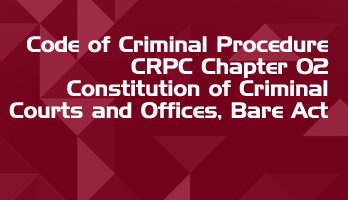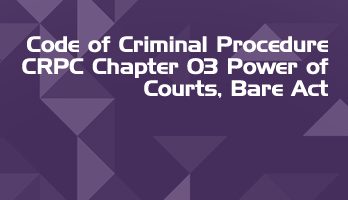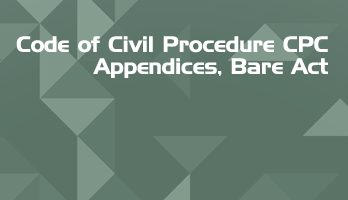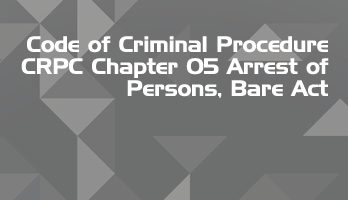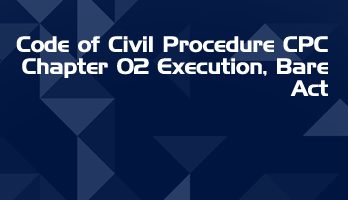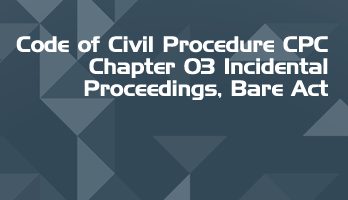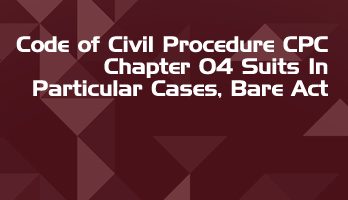A 'Bare act' is the actual legislation passed by the Parliament of India. Generally, an act sets out the high level legal and policy principles applicable to the subject matter of the law.
Most acts are accompanied by 'subsidiary legislation' such as rules, regulations, notifications and orders; which address the actual implementation detail of the act.
Free Full Course Available on LawMint's YouTube Channel
How to Land Your Dream LLB Internship in a Top Law Firm
- Part 1 - Introduction
- Part 2 - Internship Planning
- Part 3 - Internship Research
- Part 4 - Building Your Profile
- Part 5 - The Email
- Part 6 - The Resume
- Part 7 - The Cover Letter
- Part 8 - The Interview
- Part 9 - Self Development
Practical and comprehensive course, with real examples and step-by-step analysis of the complete internship application process. Check out LawMint's YouTube channel now!
Code of Criminal Procedure, 1973
Chapter 16 – Commencement Of Proceedings Before Magistrates
Section 204 – Issue of process
- If in the opinion of a Magistrate taking cognizance of an offence there is sufficient ground for proceeding, and the case appears to be –
- a summons – case, he shall issue his summons for the attendance of the accused, or
- a warrant – case, he may issue a warrant, or, if he thinks fit, a summons, for causing the accused to be brought or to appear at a certain time before such Magistrate or (if he has no jurisdiction himself) some other Magistrate having jurisdiction.
- No summons or warrant shall be issued against the accused under Sub – Section (1) until a list of the prosecution witnesses has been filed.
- In a proceeding instituted upon a complaint made in writing, every summons or warrant issued under Sub – Section (1) shall be accompanied by a copy of such complaint.
- When by any law for the time being in force any process – fees or other fees are payable, no process shall be issued until the fees are paid and, if such fees are not paid within a reasonable time, the Magistrate may dismiss the complaint.
- Nothing in this section shall be deemed to affect the provisions of section 87.
Section 205 – Magistrate may dispense with personal attendance of accused
- Whenever a Magistrate issues a summons, he may, if he sees reason so to do, dispense with the personal attendance of the accused and permit him to appear by his pleader.
- But the Magistrate inquiring into or trying the case may, in his discretion, at any stage of the proceedings, direct the personal attendance of the accused, and, if necessary, enforce such attendance in the manner hereinbefore provided.
Section 206 – Special summons in cases of petty offence
- If, in the opinion of a Magistrate taking cognizance of a petty offence, the case may be summarily disposed of under section 260 or section 261, the Magistrate shall, except where he is, for reasons to be recorded in writing of a contrary opinion, issue summons to the accused requiring him either to appear in person or by pleader before the Magistrate on a specified date, or if he desires to plead guilty to the charge without appearing before the Magistrate, to transmit before the specified date, by post or by messenger to the Magistrate, the said plea in writing and the amount of fine specified in the summons or if he desires to appear by pleader and to plead guilty to the charge through such pleader, to authorise, in writing, the pleader to plead guilty to the charge on his behalf and to pay the fine through such pleader: Provided that the amount of the fine specified in such summons shall not exceed one thousand rupees.
- For the purposes of this section, “petty offence” means any offence punishable only with fine not exceeding one thousand rupees, but does not include any offence so punishable under the Motor Vehicles Act, 193 1, or under any other law which provides for convicting the accused person in his absence on a plea of guilty.
- The State Government may, by notification, specially empower any Magistrate to exercise the powers conferred by Sub – Section (1) in relation to any offence which is compoundable under section 320 or any offence punishable with imprisonment for a term not exceeding three months, or with fine or with both where the Magistrate is of opinion that, having regard to the facts and circumstances of the case, the imposition of fine only would meet the ends of justice.
Section 207 – Supply to the accused of copy of police report and other documents
In any case where the proceeding has been instituted on a police report, the Magistrate shall without delay furnish to the accused, free of cost, a copy of each of the following:
- the police report;
- the first information report recorded under section 154;
- the statements recorded under Sub – Section (3) of section 161 of all persons whom the prosecution proposes to examine as its witnesses, excluding therefrom any part in regard to which a request for such exclusion has been made by the police officer under Sub – Section (6) of section 173;
- the confessions and statements, if any, recorded under section 164;
- any other document or relevant extract thereof forwarded to the Magistrate with the police report under Sub – Section (5) of section 173: Provided that the Magistrate may, after perusing any such pan of a statement as is referred to in clause (iii) and considering the reasons given by the police officer for the request, direct that a copy of that part of the statement or of such portion thereof as the Magistrate thinks proper, shall be furnished to the accused: Provided further that if the Magistrate is satisfied that any document referred to in clause (v) is voluminous, he shall, instead of furnishing the accused with a copy thereof, direct that he will only be allowed to inspect it either personally or through pleader in Court.
Section 208 – Supply of copies of statements and documents to accused in other cases triable by Court of Session
Where, in a case instituted otherwise than on a police report, it appears to the Magistrate issuing process under section 204 that the offence is triable exclusively by the Court of Session, the Magistrate shall without delay furnish to the accused, free of cost, a copy of each of the following:
- the statements recorded under section 200 or section 202, or all persons examined by the Magistrate;
- the statements and confessions, if any, recorded under section 161 or section 164;
- any documents produced before the Magistrate on which the prosecution proposes to rely: Provided that if the Magistrate is satisfied that any such document is voluminous, he shall, instead of furnishing the accused with a copy thereof, direct that he will only be allowed to inspect it either personally or through pleader in Court.
Section 209 – Commitment of case to Court of Session when offence is triable exclusively by it
When in a case instituted on a police report or otherwise, the accused appears or is brought before the Magistrate and it appears to the Magistrate that the offence is triable exclusively by the Court of Session, he shall –
- commit, after complying with the provisions of section 207 or section 208, as the case may be, the case to the Court of Session, and subject to the provisions of this Code relating to bail, remand the accused to custody until such commitment has been made;
- subject to the provisions of this Code relating to bail, remand the accused to custody during, and until the conclusion of, the trial;
- send to that Court the record of the case and the documents and articles, if any, which are to be produced in evidence;
- notify the Public Prosecutor of the commitment of the case to the Court of Session.
Section 210 – Procedure to be followed when there is a complaint case and police investigation in respect of the same offence
- When in a case instituted otherwise than on a police report (hereinafter referred to as a complaint case), it is made to appear to the Magistrate, during the course of the inquiry or trial held by him, that an investigation by the police is in progress in relation to the offence which is the subject – matter of the inquiry or trial held by him, the Magistrate shall stay the proceedings of such inquiry or trial and call for a report on the matter from the police officer conducting the investigation.
- If a report is made by the investigating police officer under section 173 and on such report cognizance of any offence is taken by the Magistrate against any person who is an accused in the complaint case, the Magistrate shall inquire into or try together the complaint case and the case arising out of the police report as if both the cases were instituted on a police report.
- If the police report does not relate to any accused in the complaint case or if the Magistrate does not take cognizance of any offence on the police report, he shall proceed with the inquiry or trial, which was stayed by him, in accordance with the provisions of this Code.
Important Central Acts in Regional Languages
Legislative department website also features regional language versions of several important Central Acts.
Free Full Course Available on LawMint's YouTube Channel
How to Land Your Dream LLB Internship in a Top Law Firm
- Part 1 - Introduction
- Part 2 - Internship Planning
- Part 3 - Internship Research
- Part 4 - Building Your Profile
- Part 5 - The Email
- Part 6 - The Resume
- Part 7 - The Cover Letter
- Part 8 - The Interview
- Part 9 - Self Development
Practical and comprehensive course, with real examples and step-by-step analysis of the complete internship application process. Check out LawMint's YouTube channel now!





